RYOKANS providing rooms with private open-air baths
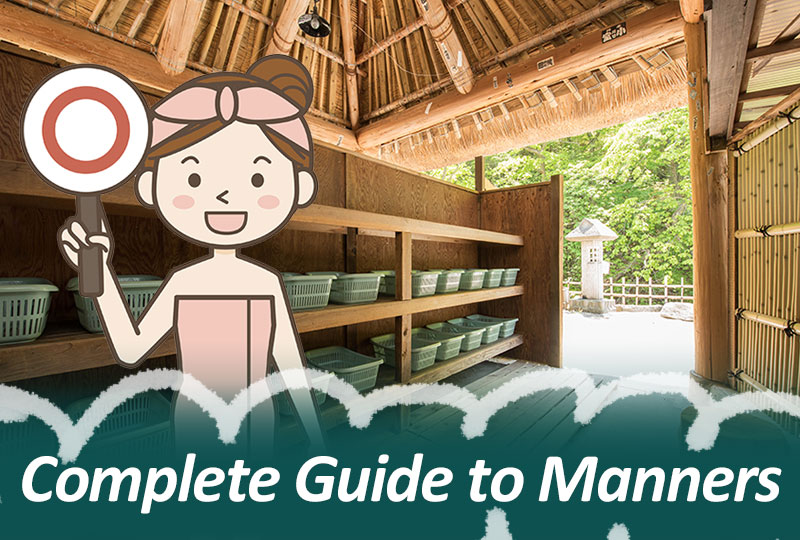
450+ best luxury ryokans in Japan, private hot spring, open-air bath, search by views - Selected Onsen Ryokan
March 20, 2019 update

Photo: Ryokan Tamagoyu
English | 繁體中文 | 简体中文 | 한국어 | ภาษาไทย | Bahasa Melayu
Different from leisure hot springs facilities in other countries that allow wearing swimsuits, onsens are places to refresh you in a state of nature, and have a lot of unique etiquettes, rules and taboos. As they are common knowledge for Japanese people, most of them are not clearly written at the onsens, so first-timers may feel uneasy, just like walking through a minefield. However, if you understand the essence and spirit of Japanese hot springs, you can enjoy them with peace of mind. This article runs through the 30 dos and don’ts to know before having a bath at an onsen. After reading it, you will never make a false step and get scorched.
* Please refer to this advanced-level article in order to know the soul of onsens. You will understand the reasons behind the manners listed here.
* For tattoos at onsens, please read this article.
* We truly want you to experience large public onsen baths, but people who prefer privacy do have more private choices, like couple onsens and family onsens.
Let’s start from the dressing room, which serves as the entrance of an onsen.
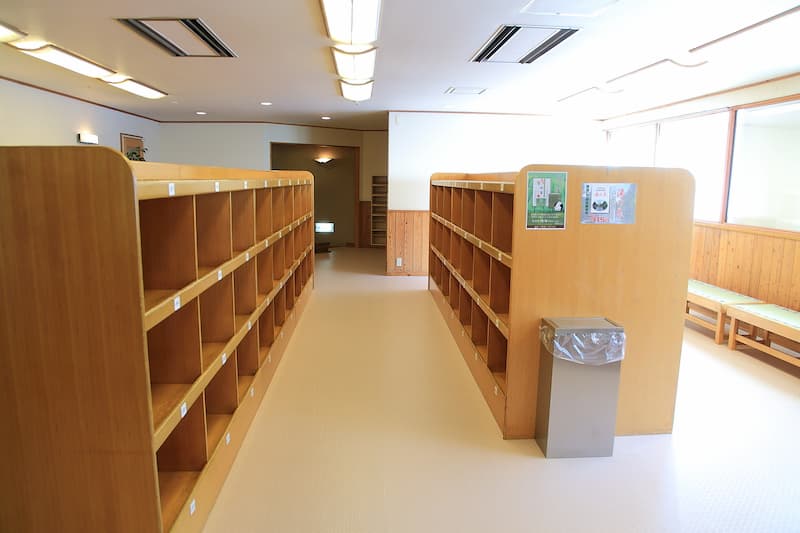 Photo: Hotel Taisetsu
Photo: Hotel Taisetsu
1. Put your valuables into the safe in the guest room or leave them to reception, and put the room key into dedicated small lockers (if available) in the dressing room. Once entering the dressing room, put your clothes and other items into a large locker or basket provided by the ryokan.
2. Before going to the hot spring area, get naked and only bring the small face towel with you.
3. The large bath towel is NOT a “wrappage” for hiding your body, so don’t bring it into the public bath zone. It is for drying your body after your bath.
4. Onsen is not a pool, so don’t wear swim goggles or swimming cap. People with bad eyesight can wear glasses at onsens.
If you change into yukata (causal summer kimono) at the guest room in advance, you can smoothly take off it before the bath and put it on after. About how to wear a yukata, just remember to place the left side over the right one. So, you are now in the public bath area.
Please go to the washing space first.
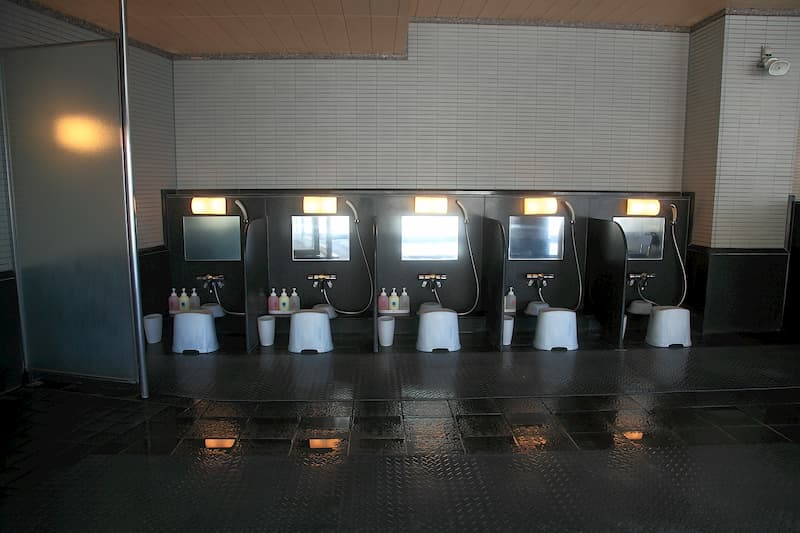 Photo: Hotel Taisetsu
Photo: Hotel Taisetsu
5. Wash your body and hair at the washing space before soaking in the tubs. You can find shampoo, conditioner and shower gel there.
6. Don’t forget to remove your makeup. Some onsens provide cleansing oil at the washing place, but you can also bring your own with you.
7. Don’t wash your clothes, clip your nails, or dye your hair at the washing space, which is only for cleaning your body and hair.
8. Don’t hold a place at the washing space with your personal belongings. If the washing space is jam-packed, be patient and wait for a while.
9. Careful not to splash water on people nearby. Some people like to stand up and pour water over head wildly, but please don’t do that.
10. Don’t occupy the washing space for a long time. The real pleasure comes when you enter the tub, so there’s no reason to keep staying in the washing space.
11. After washing your body and hair, please pour water on the washbowl, chair and the floor, in order to show respect to the next person. This is also the Japanese spirit of “cast no dirt into the well that gives you water”.
12. If you have long hair, hook up your hair with a barrette, scrunchie or hair tie after washing yourself, so that the hair won’t go into the hot spring water. You can also wear a shower cap.
Please don’t go in the hot spring immediately after drinking alcoholic beverages. Blood circulation may become overly effective and overload your heart. This also increase the risk to get drunk and to suffer from cerebral anemia when you leave the water. A hammered person may also cause nuisance to others.
And then, it’s time to take the water.
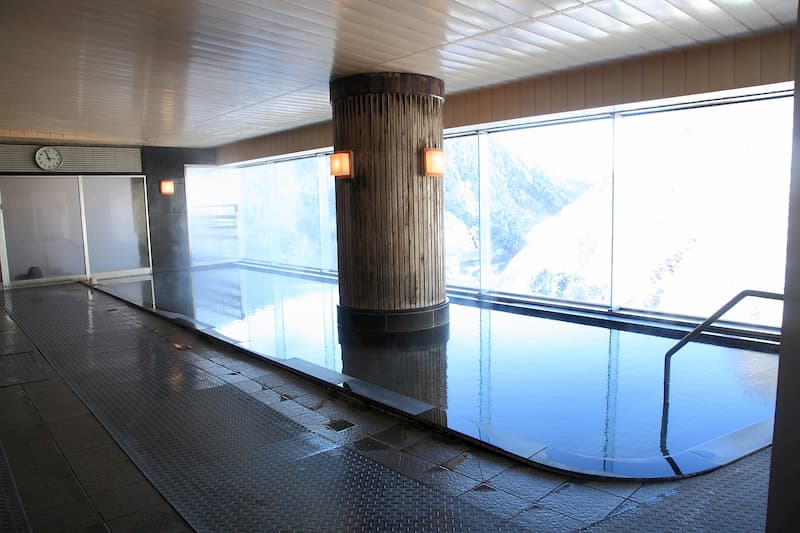
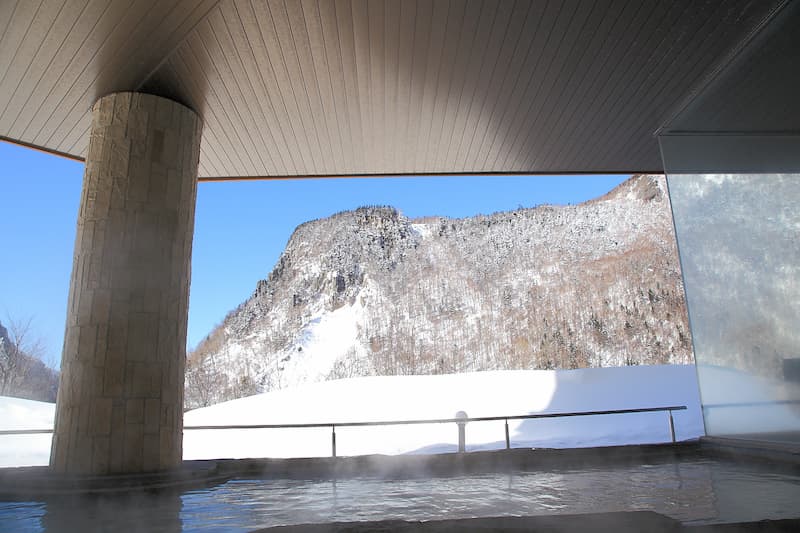
Photo: Hotel Taisetsu
13. Before entering the bath, pour hot water on yourself at a place called “kake-yu” near the entrance of the hot spring zone. In order to let your body adjust to hot water, avoid rapid change in blood pressure, and relieve the burden on the heart, you should pour water on your feet first, and then gradually go up until you reach the neck.
14. Calmly walk into the water, instead of jumping into it. Onsen is not a place for Olympic sports!
15. Don’t get the face towel into the water. You can put it on your head, hold it in your hand, or put it near the bath as long as it doesn’t become an encumbrance to others. You may have seen female onsen visitors wrapping themselves up in towels on TV, but that’s just a measure to clear the condition for broadcasting, so don’t imitate them. That’s simply unhygienic. You can use the face towel to wipe sweat off your face.
16. To maintain good hygiene, don’t scrub yourself or wash your hair while soaking in the tub. As onsen is not a beauty salon, so please also refrain from wearing a facial mask. Women should not dip in a hot spring during a menstrual period.
17. Don’t swim, dive, work around, or chase each other in the water. Also, don’t float on your back in the hot spring. It’s very annoying to others if your spread-eagle yourself on the water. The feeling of freedom may be marvellous, but please know where to stop. Having a hot spring bath silently and politely is the best method to make everybody relax and enjoy an elegant time.
18. Onsens are not like resorts in other countries, so don’t read books, eat or drink. Focus on the onsen experience itself.
19. Don’t occupy baths with a very limited number, like “tub bath” and “bed bath”, for a long time. It’s important to meet each other halfway.
20. Don’t occupy the space near the entrance of each bath. That will block others’ path to the tub.
21. Don’t add cold water into the bath even if there is a tap over the bathtub. If you think the bath temperature is too high, just go to another bath. People are in that bath because they like the hotness. Keeping the cold water running in the bath is considered exceptionally rude.
22. Chatting with other people for cultural exchange is nice, but don’t try to talk to a person persistently if he/she shows no interest. That would become harassment.
23. Don’t stare at others’ bodies or get too close to other people. Remember that it’s important to maintain a comfortable environment for everybody. People would not look at you carefully either, so you don’t need to worry so much about your body shape or the status of hair removal.
In order to prevent a sudden rise of blood pressure and reduce the heart’s workload, you should get in a lower-temperature bath first, and then go to hotter baths after adjusting yourself. For health and safety reasons, you should not keep soaking in the bath for a period exceeding 15 minutes.
So you are totally relaxed now.
Let’s leave the hot spring area.
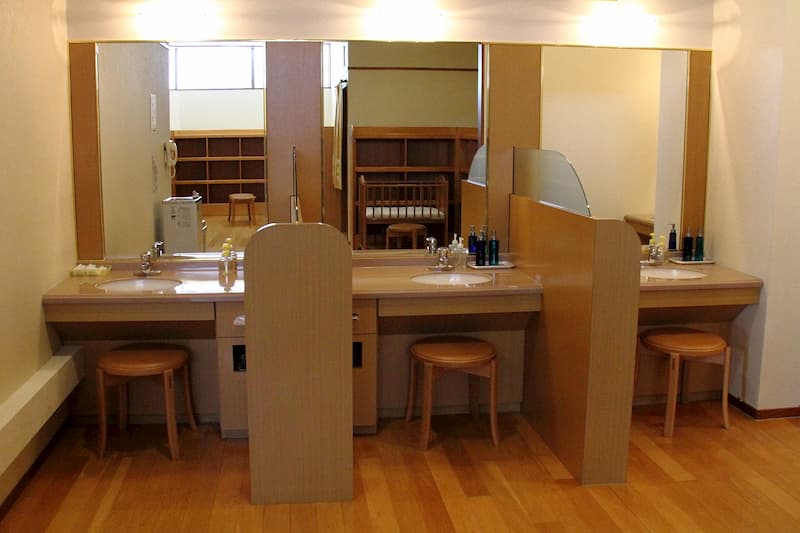 Photo: Hotel Taisetsu
Photo: Hotel Taisetsu
24. You should roughly dry your body with the face towel before entering the dressing room, or you would make the floor slippery and pose a danger to others.
25. You should put on your clothes or yukata before using the hair dryers or cosmetic products in the dressing room. It is bad manners to stay naked while using those items.
26. Let’s meet each other halfway when you use amenities in the dressing room. After using a comb, please put it in a dedicated place, instead of putting it back where you got it from.
Most onsens are partially barrier-free, as they usually have handrails at the entrance of each hot spring bath. That said, handrails are not installed along the way from the entrance of the onsen zone to the baths, and the hot spring ingredients may make the floor even more slippery, so please take care. People who need nursing care should visit an onsen with a caregiver.
Last but not least, there are some general advices that are not limited to a specific area.
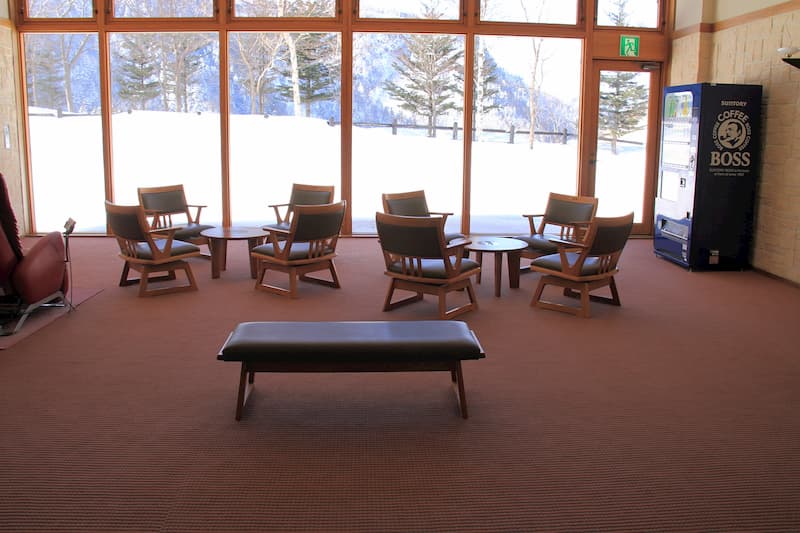 Photo: Hotel Taisetsu
Photo: Hotel Taisetsu
27. You should not talk loudly in the public bath zone, dressing room or washing space. Please think with others’ minds, let everybody feel comfortable, and spend a graceful time.
28. Don’t run in any area. It’s dangerous to other people as well as yourself.
29. Don’t take photos or shoot videos either in the onsen zone or the dressing room. Even selfies may photograph other people.
30. Don’t allow primary school students or older children to enter the opposite sex’s section. It is a way to protect small girls from potential risks. Older kids may also embarrass people of the opposite sex.
If there are “mist saunas” or “steam saunas” in the onsen area, please pour water on the chair you used to show good manners.
We have run through 30 rules and manners, divided into five categories, and five special tips to help you fully enjoy onsens. They can be wrapped up with three conclusions listed below.
Firstly, keep the onsen hygienic and don’t get the environment dirty.
Secondly, bear in mind the onsen is not your own property, and respect others’ feelings.
Thirdly, remember that the onsen is a place for relaxation and healing, and maintain the calm and elegant atmosphere.
A person who keeps these three conclusions in mind will get into all the etiquettes and rules naturally. Remember these three, and have the 30 points in the back of your head, so that you can enjoy onsens in a pleasant environment for everybody. Happy onsen life to you!
March 20, 2019 update
A Japanese onsen ryokan (hot spring inn) is a lodging facility that carries on the traditions of age
READ MOREMarch 10, 2017 update
Occupy the whole hot spring with your lover! Let’s enjoy our “couple onsen”...
READ MOREOctober 22, 2018 update
Family gathering at Japanese hot spring! Introduction to our “family onsen”--- Hokkaido, Osaka, Kyot
READ MOREAugust 28, 2023 update
From check-in to entering the washitsu with open-air bath (first day) - Arriving at Ogotoonsen Stati
READ MOREAugust 28, 2023 update
From soaking in the public bath to kaiseki dinner and futon bedtime (first day) - We requested dinne
READ MOREAugust 28, 2023 update
From breakfast to check-out (second day) - The morning sun entered the room as I opened the curtains
READ MOREMarch 20, 2018 update
In Japan, people belonging to anti-social organisations that commit violent crimes called “yakuza” h
READ MOREMarch 20, 2019 update
Different from modern western-style hotels in cities, onsen ryokans are places where elements of tra
READ MOREMarch 20, 2019 update
Introduction to Japanese-style room “washitsu” at onsen ryokans
READ MORESeptember 21, 2018 update
Since ancient times, Japanese people have been practising medicinal hot spring baths, called “To-ji”
READ MORENovember 22, 2018 update
People from over the world come to this nation to enjoy Japanese hot spring, or onsen, but many of t
READ MORE